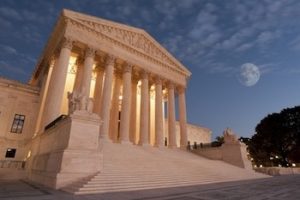 On Monday, March 27, 2017, the Supreme Court heard oral arguments in TC Heartland v. Kraft Foods. In this case, the Court will determine whether patent infringement actions should be limited to judicial districts where the defendant resides, or has committed acts of infringement and has a regular and established place of business.
On Monday, March 27, 2017, the Supreme Court heard oral arguments in TC Heartland v. Kraft Foods. In this case, the Court will determine whether patent infringement actions should be limited to judicial districts where the defendant resides, or has committed acts of infringement and has a regular and established place of business.
The law currently allows patent infringement actions to be brought in any judicial district where a defendant is subject to personal jurisdiction. This broader rule, which has been standing for 30 years, generally permits cases to be brought in districts where infringement has been committed, such as the Eastern District of Texas, even if the defendant has no established place of business in that district.
Overall, the justices did not give any clear indication as to how they would decide the case, but did raise legitimate questions on both sides. For example, the justices’ were concerned that this case may not be the proper vehicle for addressing litigation in forums perceived to be friendly to plaintiffs, such as the Eastern District of Texas or Delaware. However, there were also concerns, particularly from Chief Justice Roberts, regarding what he identified as 25% of cases being brought in the Eastern District of Texas, and by other justices regarding perceived forum shopping and excessive jury verdicts.
First to argue was the attorney for the defendant and petitioner TC Heartland, which seeks to change the law and narrow where cases may be brought.
Justices Kagan and Ginsburg seemed skeptical. Indeed, Congress has already passed a general venue statute that defined residency “for all venue places – all venue purposes,” as Justice Ginsburg put it. Justice Kagan chimed in, questioning the propriety of overturning the broader rule, which she called “the decision that the practice has conformed to” and the “practical backdrop” against which Congress was legislating.
Next, Justice Breyer noted the many arguments and briefs discussing the Eastern District of Texas, but which he felt were not relevant. He noted the many amici briefs, saying that “they’re filled with this thing about a Texas district which they think has too many cases.” He asked: “What’s this got to do with this?” Of course, the TC Heartland case was brought in Delaware, not Texas, and involves an Indiana company.
On a related point, Justice Ginsburg noted that Delaware was also thought to be a friendly forum. Indeed, a 2016 report from PWC includes Delaware among jurisdictions deemed to be “more favorable venues for patent holders, with shorter time-to-trial, higher success rates and greater median damages awards.” Thus, any change that would require cases to be brought where a defendant “resides” could lead to more cases being brought in Delaware, not fewer.
Next, Justice Breyer pointed out that because TC Heartland is not even a corporation, the Court should not be deciding rules involving where corporate defendants may be sued. Stating the concern pointedly, he said: “you’re asking us to decide where venue is proper for a corporation, and you are not a corporation.” Therefore, he asked “on what basis are we supposed to decide that?”
That TC Heartland was not a corporation seemingly compounded the Court’s concerns regarding whether the case is the proper vehicle for addressing patent venue concerns.
Justice then Kagan drew laughter from the crowd, pointing out that the theme for the day was, “when 30 years of practice goes against you, what happens?”
Turning to Kraft Food’s argument, Justice Roberts seemed troubled that the broader rule that Congress adopted, which permits civil actions in any district where a defendant is subject to personal jurisdiction, was passed without any discussion of overruling a narrower rule. He also noted that the law Congress passed indicates “except as otherwise provided by law,” which might preserve a narrower exception.
The justices then discussed other concerns, including how to determine where a defendant “resides” under the narrower proposed rule. For example, this raises issues with unincorporated entities, LLCs, foreign defendants, and other types of corporate entities.
The justices also discussed the purpose of the patent act’s narrower venue statute, in view of the broader general venue statute that is currently applied to patent cases. On that point, the justices struggled to find meaning in the patent’s venue provision, noting that it would only apply to individual people being sued for infringement, which rarely if ever happens.
Justice Kagan then returned to the Eastern District of Texas, asking Kraft’s counsel why so many cases were brought in that district. Kraft counsel admitted that they were sued there as well, but that the complaints defendants have “tend to be complaints about how the cases are managed, how discovery takes place, how motions practice is handled, and so on.” Justice Roberts expressed concern about addressing such issues, and expressed concerns that “25 percent of the nationwide cases are there.” Justices Kagan and Kennedy noted concerns about forum shopping and jury verdicts.
Lastly, TC Heartland’s attorney made concluding arguments. Notably, Justice Kagan asked about what a narrower rule would do to pharmaceutical cases against generic companies, which should arguably be consolidated in one district. The justices didn’t have any further questions.

![[IPWatchdog Logo]](https://ipwatchdog.com/wp-content/themes/IPWatchdog%20-%202023/assets/images/temp/logo-small@2x.png)

![[Advertisement]](https://ipwatchdog.com/wp-content/uploads/2024/04/UnitedLex-May-2-2024-sidebar-700x500-1.jpg)
![[Advertisement]](https://ipwatchdog.com/wp-content/uploads/2024/04/Artificial-Intelligence-2024-REPLAY-sidebar-700x500-corrected.jpg)
![[Advertisement]](https://ipwatchdog.com/wp-content/uploads/2024/04/Patent-Litigation-Masters-2024-sidebar-700x500-1.jpg)

![[Advertisement]](https://ipwatchdog.com/wp-content/uploads/2021/12/WEBINAR-336-x-280-px.png)
![[Advertisement]](https://ipwatchdog.com/wp-content/uploads/2021/12/2021-Patent-Practice-on-Demand-recorded-Feb-2021-336-x-280.jpg)
![[Advertisement]](https://ipwatchdog.com/wp-content/uploads/2021/12/Ad-4-The-Invent-Patent-System™.png)






Join the Discussion
2 comments so far.
pete
May 31, 2017 02:16 pmNow that SCOTUS in TC Heartland ruled that venue for patent cases is now determined solely by 1400(b), one can find the questions in the oral arguments by the justices to be rather revealing, and also helpful in how future patent law should be reformed to solve the patent troll problem. The problem actually just got worse. What big business needs to realize is that the more difficult they make it for small inventors to enforce their rights, the more likely they will actually cede their IP over to PAEs because small inventors cannot afford to protect their rights, and the PAEs can. Thus fueling the very fire big business wants to put out.
As a result of Heartland, forum shopping has been nixed by Heartland, however, in favor of defendants and at the expense of small inventors, researchers, and universities.
What was repeatedly recognized throughout the oral arguments was that the statutes for venue are poorly written and not clear. As Justice Kagan said, “When 30 years of practice goes against you, what happens?” And that practice was following the current interpretation of poorly written statutes. Dabney, Esq. (petitioner in Heartland’s oral argument) summed it up rightly when he said: “So if there is a problem with the way Congress wrote the law, that’s just too bad. That’s not for a court to come in and overrule precedent in order to achieve a goal like that.” SCOTUS does not have the authority to write law, so the onus now is on Congress to craft a better 1400(b).
At 45:25 in the oral argument — https://www.oyez.org/cases/2016/16-341 —
Justice Sotomayor asks why so many patent suits go to Texas. William Jay Esq. (respondent for Kraft) discloses that Congress is better equipped to handle the Texas venue problem rather than a SCOTUS binary decision on venue, one of the things being: “… Congress can … create a definition that doesn’t turn on the word resides at all … [Congress] can add where the plaintiff has done research on the invention that is patented.” And something like that would be the solution to equal venue representation between defendants and plaintiffs.
Respondent Jay was referring to this very bill, introduced to the 114th Congress:
https://www.congress.gov/bill/114th-congress/senate-bill/2733.
With this bill’s amendments to 1400(b) and under its construction of venue:
– defendants keep their state of incorporation,
– inventors get representation because it takes into consideration where inventors reside and/or their research was done, and
– because PAEs are not the listed inventors in the patents they own, forum shopping is still nixed for them.
This bill didn’t have real importance to the 114th Congress, but with the Heartland ruling shifting even more power into the hands of big business with big pockets, it has all the more importance now. Small inventors, researchers, and universities should all speak up and encourage their representatives to get equal venue rights for inventors and big business, because now, small inventors hold worthless pieces of paper because of the expense of enforcing their IP rights. And big businesses should speak up too, because now they will see a flood of inventors granting their IP over to trolls so the investors can get a return on their investment.
Edward Heller
April 4, 2017 05:52 amGood and unbiased summary.
Can you imagine a remand asking the Fed. Cir. to determine the proper venue for an LLC under the patent venue statute when Congress has already legislated that very thing (same as corporations) and “for all venue purposes” in 1391(c)?